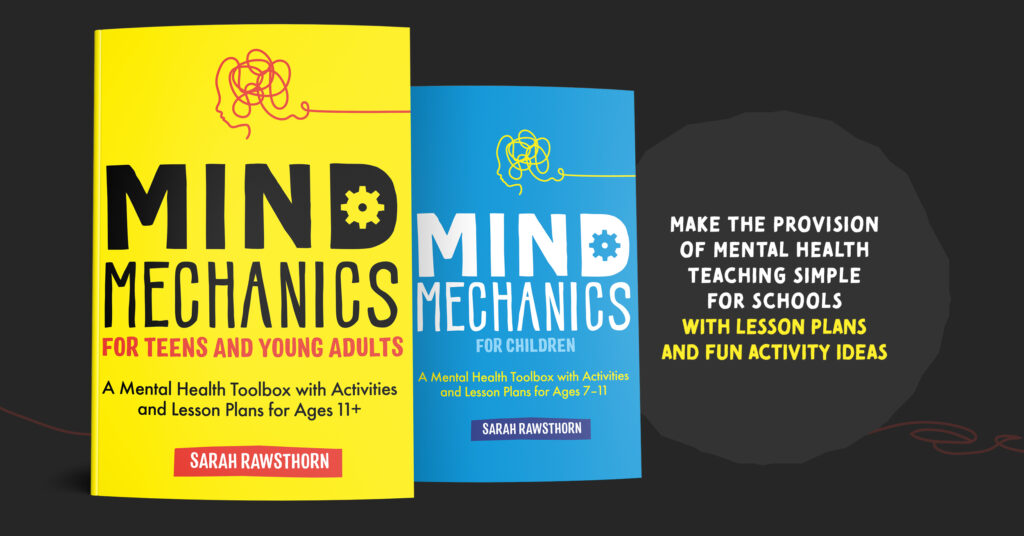
| Sarah Rawsthorn is the Founder of Mind Mechanics and Director of Edge Inclusion Partners. She has 30 years’ experience in the field of neurodiversity and social, emotional and mental health needs as an independent speaker, teacher and Local Authority SEND Advisor. She writes below about why she wrote the Mind Mechanics books. |
Young Minds report that 67% of young people interviewed believed that the pandemic will have a long-term negative effect on their mental health. This includes young people who had been bereaved or undergone traumatic experiences during the pandemic, who were concerned about whether friendships would recover, or who were worried about the loss of education or their prospects of finding work.
The Mind Mechanics books provide those who are not expert mental health practitioners, yet supporting children and young people, with a vital tool.
Mind Mechanics has been created for parents, teachers and those working with our children and young people, in a format that is simple to implement and use. There are two books, one for 7-11s and one for 11+. Each one contains a wealth of information pertaining to emotional wellbeing, in addition to the equivalent of 12 hours of themed lesson plans. Each lesson plan includes photocopiable resources.
Mind Mechanics activity plans are detailed, setting out an overview of a themed set of activities, each one timed, so that the adult has flexibility about how and when to use the book. The book can be used for occasional individual support or whole lesson periods can be devoted to delivery. In their entirety the books provide a significant proportion of a mental health curriculum.
We know that behaviour is a consequence of thought and feeling, children rarely making a conscious choice to behave inappropriately, rather, not knowing how to communicate distress or how to self-regulate. Mind Mechanics addresses this by teaching self-regulation strategies. Participants are given the opportunity to engage in creative, fun activities, learning how to better identify their feelings and understand how their body and brain responds to emotion.
Mind Mechanics explains unhelpful thinking patterns and how to be more self-compassionate and identify strengths. The books introduce a wide range of evidence based soothing strategies.
Through a series of practical, creative tasks, Mind Mechanics are equipped with a Toolbox for Their Brainbox.
Mind Mechanics was founded as a collaborative activity undertaken by the multidisciplinary team at Edge Inclusion Partners, a community interest company, founded 10 years ago. We tipped the contents of our heads out and created a wholistic intervention, knowing that one size does not fit all. We wished to create an offering to children and young people which included a wide range of all the NICE approved strategies.
We also chose to include pre and post intervention tools, not only to provide evidence of the impact of the programme but also as a resource to help teachers to identify specific areas of need and to use as referral information for the specialist teams at CAMHS.
Mind Mechanics was piloted in a range of settings from Primary Schools to P.R.U.s and honed and improved over a period of three years. We continue to go into schools to model delivery of the programme in its entirety, training teachers through modelling but decided to publish Mind Mechanics as books to reach a wider audience of children, young people, their parents, carers and teachers giving all our readers ‘A Toolbox for your Brainbox’.
Below are reactions we gathered from some of the children who took part in the Mind Mechanics course, and benefitted from learning these all important life skills and strategies.
‘Now I have got in control of my emotions’
‘I think I’ll be able to stay calm and not get so stressed about homework and exams’
‘I have improved how I cope with certain things and I get less annoyed and frustrated’
Sarah Rawsthorn’s comprehensive resources to support schools in teaching pupils about mental health include: Mind Mechanics for Children and Mind Mechanics for Teens and Young Adults.
If you want to sign up to the newsletter to hear more updates around special education, mental health, wellbeing and more, click here.